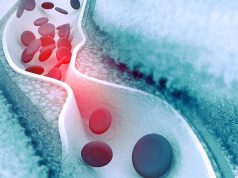Statin use recommended for adults aged 40 to 75 years with at least one CVD risk factor and estimated 10-year CVD event risk of ≥10 percent
WEDNESDAY, Aug. 24, 2022 (HealthDay News) — The U.S. Preventive Services Task Force (USPSTF) concludes that people aged 40 to 75 years at high risk for cardiovascular disease (CVD) should receive statins. This finding forms the basis of a final recommendation statement published in the Aug. 23/30 issue of the Journal of the American Medical Association.
Roger Chou, M.D., from the Oregon Health & Science University in Portland, and colleagues updated the 2016 review on statins for primary prevention of CVD. Data were included from 26 studies. The researchers found that statins were significantly associated with a reduced risk for all-cause mortality, stroke, myocardial infarction, and composite cardiovascular outcomes (risk ratios, 0.92, 0.78, 0.67, and 0.72, respectively); the association with cardiovascular mortality was not statistically significant. In groups defined by demographic and clinical characteristics, relative benefits were consistent, but data were limited for those older than 75 years.
Based on these findings, the USPSTF recommends that statins should be prescribed for primary prevention of CVD in adults aged 40 to 75 years with no CVD history and with one or more CVD risk factors and an estimated 10-year CVD event risk of 10 percent or greater (B recommendation). For adults aged 40 to 75 years with no history of CVD and who have one or more of these CVD risk factors and an estimated 10-year CVD event risk of 7.5 to <10 percent, statins may be selectively offered (C recommendation). For those aged 76 years or older with no history of CVD, the evidence is insufficient to determine the balance of benefits and harms of statin use ( I statement).
“Statins effectively and safely prevent first heart attacks and strokes for some people,” USPSTF member John Wong, M.D., said in a statement. “Whether someone should start taking a statin depends on their age and their risk for having a first heart attack or stroke.”
Evidence Report
Final Recommendation Statement
Editorial 1
Editorial 2
Editorial 3
Editorial 4
Copyright © 2022 HealthDay. All rights reserved.








